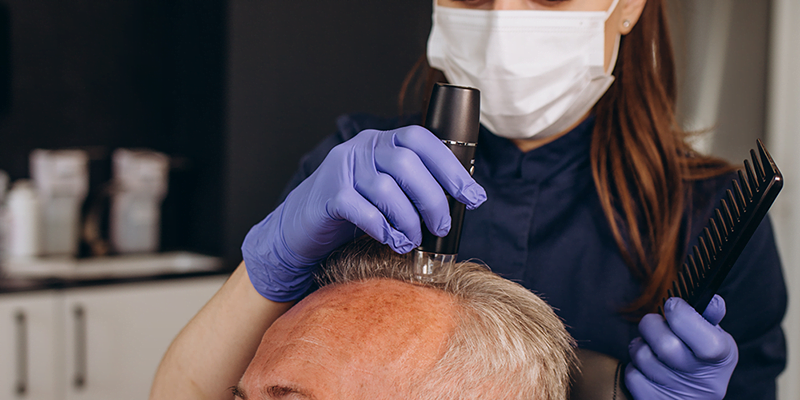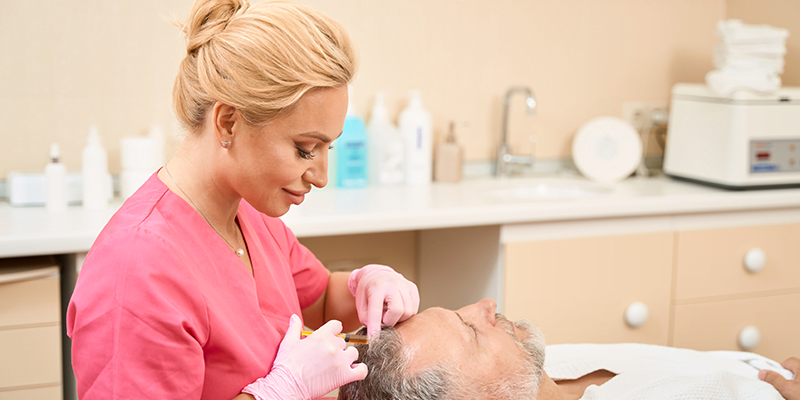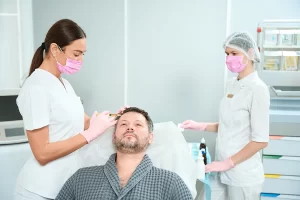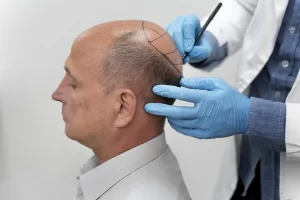Hair loss can be distressing, impacting both appearance and self-esteem. Hair transplantation has become a highly effective and permanent solution for restoring hair. However, a common question is: “What is the ideal age for a hair transplant?” This guide will explore the factors that determine the best age for undergoing a hair transplant, helping you make an informed decision. At Lenus Clinic, we prioritize patient education and individualized care, ensuring you understand every aspect of the procedure.
Understanding Hair Loss
Before discussing the ideal age for a hair transplant, it’s important to understand hair loss. Hair loss, especially male pattern baldness, is a progressive condition influenced by genetics, hormones, and age. It often starts with a receding hairline or thinning crown and can lead to significant baldness if untreated.

Key Factors Influencing Hair Transplant Timing
1. Age and Hair Loss Progression
- Teens and Early 20s: Hair loss can be unpredictable at this age. A hair transplant is generally not recommended because the pattern of hair loss is not fully established, which can lead to unnatural results if hair loss continues.
- Mid 20s to Early 30s: This is often considered the ideal age range for a hair transplant. By this time, the pattern of hair loss is usually more predictable, making the transplant more strategic and successful.
- Late 30s and Beyond: Hair loss typically stabilizes around this age. If hair loss has become stable, this can also be a good time for a transplant. However, the availability of donor hair and the overall health of the scalp must be considered.
2. Stability of Hair Loss
The stability of hair loss is crucial in determining the right time for a hair transplant. If hair loss is still active and progressing rapidly, it’s better to wait until it stabilizes to ensure natural results.
- Signs of Stable Hair Loss: Slowing hair loss over the past few years, a consistent pattern of baldness, and minimal shedding may indicate that hair loss has stabilized.
3. Availability of Donor Hair
Donor hair is the hair transplanted from one part of the scalp to the balding areas. The quality and quantity of donor hair are essential for a successful transplant.
- Younger Patients: Younger individuals may have more robust donor hair, but using it prematurely can deplete this critical resource if further hair loss occurs.
- Older Patients: As age increases, the density and health of donor hair might decrease, making it crucial to carefully evaluate the donor area before deciding on a transplant.
Finding the Ideal Age While Balancing Expectations and Reality
1. Early 20s: Proceed with Caution
The early 20s are usually too soon for a hair transplant. Hair loss patterns are still developing, and there’s a high risk of needing additional transplants as hair loss continues.
- Expert Recommendation: For those in their early 20s, it’s often better to explore non-surgical options like medications (e.g., minoxidil or finasteride) to slow hair loss.
2. Mid to Late 20s: An Optimal Window
The mid to late 20s are often considered ideal for a hair transplant. By this age, hair loss patterns are typically established, and the risk of future hair loss requiring additional procedures is reduced.
- Why This Age is Ideal: Patients are mature enough to understand the long-term implications, and the availability of healthy donor hair is usually high, leading to long-lasting results if hair loss has stabilized.
3. 30s and 40s: A Safe Bet
In the 30s or 40s, the decision often comes after observing hair loss patterns over many years.
- Advantages: Hair loss has likely stabilized, making it easier to predict long-term outcomes. The procedure can yield natural and satisfying results.
- Considerations: Ensure the donor area is still dense enough to provide good results. Patients should also consider their overall health, as certain medical conditions might affect the outcome.
4. 50s and Beyond: Still an Option
Even in their 50s or older, individuals can be good candidates for a hair transplant, especially if they have maintained a healthy donor area and are in good overall health.
- Focus on Realistic Expectations: The goal may be to achieve a fuller look rather than complete coverage.
- Health Considerations: Older patients should undergo a thorough health assessment to ensure they are suitable candidates for surgery.
Checkout our other blog: A Comprehensive Guide on How Much a Hair Transplant Costs in Turkey
Additional Factors to Consider for Hair Transplant Age
1. Psychological Readiness
Being psychologically ready for the changes and maintenance that come with a hair transplant is vital. It’s important to have realistic expectations and understand that full results may take up to a year to become visible.
2. Financial Considerations
Hair transplants are a significant financial investment. Ensure that you’re financially prepared not just for the initial transplant but also for any potential follow-up procedures.
3. Lifestyle and Maintenance
Post-transplant care is crucial for achieving the best results. This includes following a healthy lifestyle, protecting the scalp from excessive sun exposure, and potentially continuing medical treatments to maintain the health of the transplanted hair.

Conclusion
Determining the ideal age for a hair transplant depends on factors like hair loss progression, donor hair availability, and overall health. While the mid to late 20s are often considered the optimal time, excellent results can also be achieved in the 30s, 40s, and even 50s. Consulting with a qualified hair restoration specialist is key to assessing your unique situation and making the best decision.
At Lenus Clinic, we are committed to providing personalized advice and expert care at every stage of your hair restoration journey. By understanding these factors, you can make an informed decision about the best time for a hair transplant, leading to a more natural and satisfying outcome.
F.A.Q.
Q1: Can teenagers undergo a hair transplant?
A: It’s generally not recommended for teenagers to undergo hair transplants due to the unpredictable nature of hair loss at this age.
Q2: How do I know if my hair loss has stabilized?
A: A hair restoration specialist can help determine if your hair loss has stabilized by assessing your hair loss pattern over time.
Q3: Can I have a second hair transplant later in life?
A: Yes, it is possible to have a second hair transplant if necessary, provided there is enough donor hair available.
Q4: Are there non-surgical options to consider before a hair transplant?
A: Yes, medications like minoxidil and finasteride can slow down hair loss and are often recommended before considering a transplant.
Q5: What should I look for in a hair transplant surgeon?
A: Look for a surgeon with extensive experience, positive reviews, and a portfolio of successful transplants. Personal consultations are crucial to ensure you’re comfortable with the surgeon’s approach. Lenus Clinic provides all these qualities, ensuring you receive the highest standard of care.



No comment yet, add your voice below!